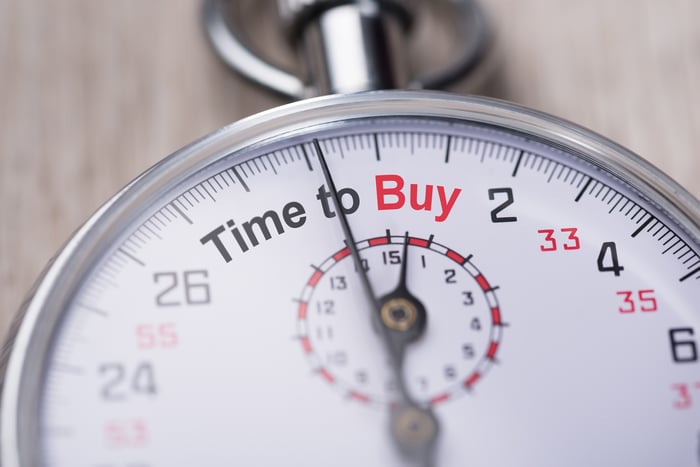It's been quite the turbulent year for the markets. Then again, it's not as if there's a modern-era precedent to dealing with pandemic. No one is certain what to expect at this point, which is why the stock market lost a third of its value in five weeks during the first quarter, as well as delivered its strongest quarterly performance in 22 years in the second quarter.
Though this volatility is likely here to stay for the foreseeable future, one potentially intriguing indicator of value that's come to light in recent months has been billionaire CEOs putting their money where their mouth is. This is to say we've seen some very wealthy, high-profile CEOs directly or indirectly (i.e. via company buybacks) signaling to Wall Street and investors that they believe their stock is cheap.

Image source: Getty Images.
Elon Musk, CEO of Tesla Motors
Admittedly, trying to understand what goes on inside the mind of Tesla (TSLA -3.55%) CEO Elon Musk is probably a fruitless endeavor. There's no denying that he's a visionary; but his thought process can vacillate almost as wildly as Tesla's share price.
But no matter how many times Musk contemplates the valuation of his own company in a tweet, there's no questioning his resolve that Tesla's stock could head significantly higher over the long run. On Valentine's Day (Feb. 14), a filing with the Securities and Exchange Commission showed that Musk had purchased 13,037 shares of Tesla for an average price of $767. For those of you keeping score at home, this $10 million purchase slightly raised his 34-million-share stake in the company, and it represents his third buy of Tesla's stock since October 2018.
While I, personally, remain skeptical of Tesla's valuation given Musk's inability to meet new production deadlines, and the company's struggles to deliver a generally accepted accounting principles (GAAP) profit, it also can't be overlooked that Tesla's more affordable Model 3 is a mass-production game-changer that'll likely help push total output in 2020 beyond 500,000 vehicles. Since Tesla's core customer tends to be more affluent, the coronavirus pandemic is unlikely to hit the electric vehicle manufacturer as hard as other automotive stocks like Ford and General Motors.
Tesla's insane share price rally, which may have been partially driven by a short squeeze, also allowed the company to raise $2.3 billion dollars through a secondary offering right around the same time Musk purchased $10 million worth of Tesla's stock. With cash no longer an immediate concern, investors are left to focus on auto delivery growth, which is an area where Tesla has mostly shined recently, and, hopefully, an improvement in the company's GAAP results.

CEO Michael Dell speaking to an audience. Image source: Dell Technologies.
Michael Dell, CEO of Dell Technologies
Perhaps no value endorsement has rung louder in recent months than the insider purchase from Michael Dell, the founder, Chairman, and CEO of Dell Technologies (DELL -1.04%). On March 20, Dell gobbled up 828,199 shares of his company's stock at an average price of $31.70, according to a filing with the Securities and Exchange Commission. This $26.3 million purchase represented Dell's first insider buying activity in two years.
Thus far, Dell's purchase looks genius, as Dell Technologies' stock has rallied to almost $54 a share, as of this past weekend. With a forward price-to-earnings ratio of around 8, Dell appears to be quite the bargain for value investors -- and at a price of $31.70 a share I certainly wouldn't argue against that thesis.
However, Dell is a different beast at $54 a share. This is a company that, like IBM, has always been tied to hardware and traditional software and is slowly but surely making the move to cloud-computing services and newer innovations. While these legacy products remain somewhat profitable for Dell, at least on the basis of adjusted earnings, they're a concrete weight in the growth department. In other words, sales growth could remain flat to slightly down over the next couple of years.
Maybe the most exciting aspect of Dell is its nearly 81% ownership stake in cloud-focused software-as-a-service provider VMware (VMW). Whereas Dell's legacy operations are mostly stagnant, VMware delivered better than 13% sales growth during the COVID-19-impacted first quarter. There's been some rumblings recently that Dell may consider spinning off its stake in VMware, which has the opportunity to be a value-unlocking proposition for Dell's stock.

A jubilant Warren Buffett at Berkshire Hathaway's annual shareholder meeting. Image source: The Motley Fool.
Warren Buffett, CEO of Berkshire Hathaway
And then there's this Warren Buffett guy, who just happens to be one of the richest people in the world, and has led Berkshire Hathaway (BRK.A 0.64%) (BRK.B 0.54%) to a jaw-dropping return of 2,744,062% over the past 55 years.
Although Warren Buffett doesn't directly buy Berkshire Hathaway's stock, he and his right-hand man Charlie Munger have the ability to deploy Berkshire Hathaway's cash hoard to repurchase shares of the company's common stock. The two criteria that need to be met prior to buybacks being initiated are that:
- Berkshire Hathaway must have at least $20 billion in cash on hand; and
- Buffett and Munger must agree that Berkshire Hathaway's share price is trading at a sizable discount to its intrinsic value.
As of the end of the first quarter, Berkshire Hathaway was sitting on a record $137 billion in cash, so the first criteria has been met many times over. As for the latter, Berkshire Hathaway ended this past weekend at 17% above its book value, which would represent its cheapest valuation to book since the end of 2012. In short, the conditions are perfect for Buffett to be a buyer of Berkshire Hathaway's stock.
In 2018, Buffett deployed around $1 billion for buybacks, with this figure jumping to roughly $5 billion in 2019. During the first quarter of 2020, almost $1.6 billion was devoted to share repurchases. Without question, Buffett's favorite stock right now is his own company, and that's not something that investors should overlook.





